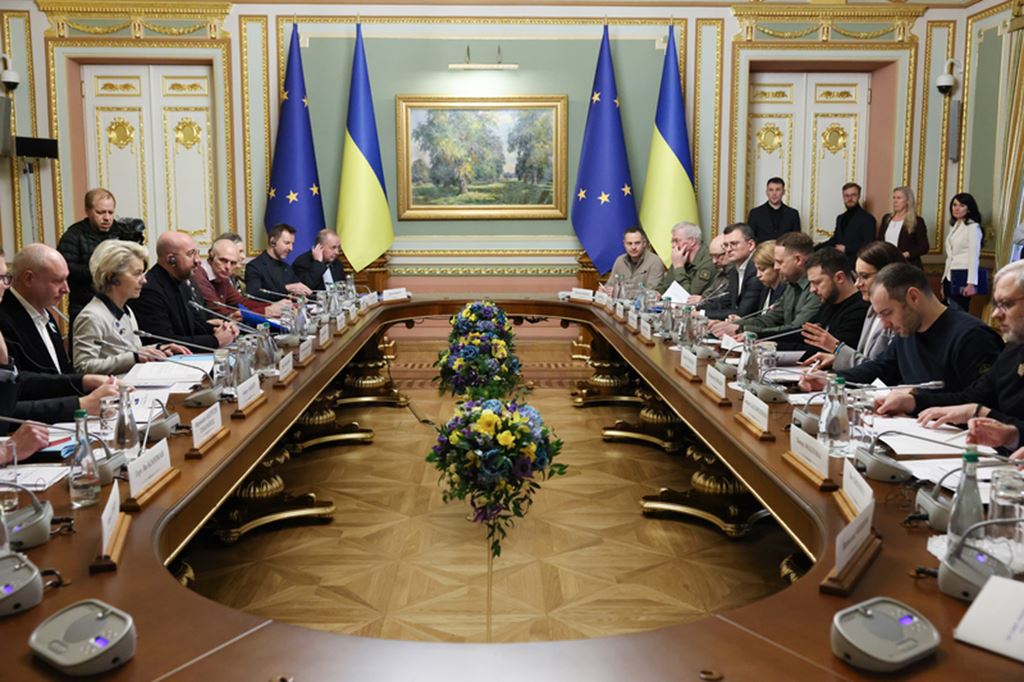Ukraine-Russia Negotiations: Zelensky's Response To Trump's Mediation

Table of Contents
Trump's Mediation Offer: An Overview
Donald Trump's offer to mediate the Ukraine-Russia conflict emerged amidst a backdrop of ongoing military actions and international diplomatic efforts. The timing of his offer, coming at a crucial juncture in the war, immediately drew significant attention. While specifics remained somewhat vague, Trump suggested his unique position and negotiating skills could facilitate a swift and effective resolution. He implied he could leverage his relationship with both Vladimir Putin and Volodymyr Zelensky to broker a deal.
- Specific elements of Trump's plan: Trump's plan lacked concrete details, but he generally emphasized a focus on immediate ceasefires and territorial compromises, potentially involving land concessions from Ukraine.
- Trump's stated rationale for involvement: Trump argued his past dealings with both leaders gave him unique insight and leverage that other mediators lacked. He positioned himself as an unbiased party, despite his controversial relationship with Putin and his past criticisms of Zelensky.
- Initial reactions from international observers: The international community reacted with a mixture of skepticism and outright rejection. Many questioned Trump's impartiality, citing his past statements and actions regarding Russia and Ukraine. Concerns were raised regarding his potential to prioritize his own interests over a genuine commitment to peace.
Zelensky's Official Response and Rationale
Zelensky's response to Trump's mediation offer was swift and firm. He publicly expressed skepticism, emphasizing Ukraine's commitment to working only with neutral and impartial mediators who prioritize Ukraine's territorial integrity and sovereignty. Zelensky’s team emphasized the importance of adhering to international law and the UN Charter in any peace negotiations.
- Direct quotes from Zelensky or his representatives: While specific quotes varied, the overarching message consistently rejected Trump’s offer, highlighting concerns about potential bias and the need for a truly impartial mediator.
- Explanation of Ukraine's position on external mediation: Ukraine's position emphasizes the necessity of a mediator who understands and respects Ukraine's unwavering commitment to its territorial integrity and its right to self-determination. Any mediation must acknowledge Russia's illegal invasion and the need for accountability for war crimes.
- Considerations about impartiality and potential biases: The perceived lack of impartiality in Trump's approach, given his past statements and actions, was a central concern for Zelensky and the Ukrainian government. This overshadowed any potential benefits that his involvement might have offered.
International Reactions and Implications
The international community largely echoed Zelensky's skepticism regarding Trump's mediation offer. The Biden administration, along with many European allies, publicly dismissed the proposal. The reaction highlighted a broad consensus on the necessity of impartiality and adherence to international norms in any mediation efforts.
- Statements from key international figures (e.g., Biden administration): The Biden administration explicitly stated its lack of confidence in Trump’s ability to act as a fair and effective mediator, emphasizing the need for a process that aligns with international law.
- Analysis of the impact on ongoing diplomatic efforts: Trump's offer, and Zelensky’s rejection, served to underscore the divisions within the international community regarding approaches to resolving the conflict. It may have temporarily disrupted or complicated ongoing diplomatic efforts led by other international bodies.
- Potential effects on future negotiations and peace prospects: The incident highlighted the complexities of achieving lasting peace and the sensitivities involved in selecting appropriate mediators. It could lead to a more cautious and thorough vetting process for future mediation attempts.
Alternative Mediation Efforts and Future Prospects
Despite Trump’s rejected offer, several other mediation efforts and initiatives continue. International organizations, including the UN and the EU, remain actively engaged in diplomatic efforts to de-escalate the conflict and find a lasting peace. These efforts often focus on humanitarian aid, prisoner exchanges, and the establishment of frameworks for future negotiations.
- Mention key international organizations involved in mediation efforts: The UN, EU, and OSCE are actively involved, along with individual countries like France and Germany, often acting as facilitators or intermediaries.
- Highlight the challenges and opportunities for future peace talks: The challenges include the deep mistrust between the parties, the significant territorial disputes, and the ongoing military actions. Opportunities lie in fostering dialogue and building a foundation of trust, even amid the ongoing hostilities.
- Discuss potential scenarios for resolving the conflict: Potential scenarios range from negotiated settlements involving territorial concessions to a prolonged stalemate or even further escalation of the conflict. The likelihood of each depends on the evolving geopolitical landscape and the willingness of both parties to compromise.
Conclusion
Zelensky's decisive rejection of Trump's mediation offer underscores the complexities of the Ukraine-Russia negotiations. The Ukrainian government's prioritization of impartial mediation, aligned with international law and respecting Ukraine's sovereignty, remains a key factor in shaping the future of peace talks. The incident highlighted the crucial role of unbiased mediators and the ongoing challenges in achieving a lasting peace. While alternative mediation efforts continue, the path to resolution remains fraught with difficulties.
Call to Action: The ongoing Ukraine-Russia negotiations require continued attention and analysis. Stay informed about developments in the Ukraine-Russia negotiations, and continue to advocate for a peaceful resolution to the conflict. Follow reputable news sources for updates on Zelensky's approach to mediation efforts and the evolving situation. Understanding the nuances of these complex negotiations is crucial to fostering a path toward lasting peace.

Featured Posts
-
 Stadium Track To Be Replaced Before Championships
May 12, 2025
Stadium Track To Be Replaced Before Championships
May 12, 2025 -
 Ufc 315 Aftermath Shevchenko Considers Weili Superfight
May 12, 2025
Ufc 315 Aftermath Shevchenko Considers Weili Superfight
May 12, 2025 -
 Jay Kelly I Nea Komodia Toy Noa Mpompak Me Kloynei Kai Santler
May 12, 2025
Jay Kelly I Nea Komodia Toy Noa Mpompak Me Kloynei Kai Santler
May 12, 2025 -
 Como Abrir Una Cuenta Gratuita En Una Billetera Virtual Uruguaya Desde Argentina
May 12, 2025
Como Abrir Una Cuenta Gratuita En Una Billetera Virtual Uruguaya Desde Argentina
May 12, 2025 -
 Thomas Mueller Omagial De Adio De La Fani La Ultimul Sau Meci Pe Allianz Arena
May 12, 2025
Thomas Mueller Omagial De Adio De La Fani La Ultimul Sau Meci Pe Allianz Arena
May 12, 2025
